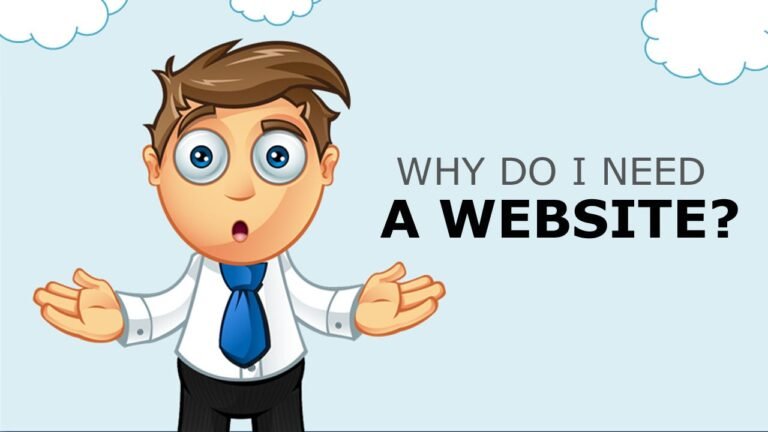Why Do I Need a Website?

If you’re still wondering if your business should have a website in 2025, the short answer is yes, hands down. Your customers today expect to be able to find what they need online. If you’re selling products, offering services, or advertising a local business, your website is your online storefront, always open and available 24/7. It’s how prospective clients discover your offerings, determine your credibility, and decide whether they’d like to do business with you.
Your company can thrive on word of mouth or social media, but without a specific site, you are losing out on increased visibility, control, and sustained development.
First Impressions Matter
Your website is usually the very first experience a visitor has of your company. In seconds, visitors form instant impressions based on what they find, how your site appears, how quickly it loads, and how simple it is to use.
By 2025, the stakes are high. Your online reputation decides how professional you come across. A dated or unprofessional site can drive away potential customers, even if your service or products are first-rate.
A responsive, clean website communicates that you’re serious about business. It inspires confidence and provides reassurance to move forward—whether that’s making contact, making a buy, or scheduling your services.
Be Where Your Customers Are
Your customers live online. Whether they’re searching for a local service in their area or researching the best provider across the UK, Google is where that journey starts.
If you’re not showing up in search engine results—or if your competitors are doing a better job online—you’re losing business before it even reaches you.
Word of mouth and social media are useful, but most customers will still look for your site before they decide to contact you. A well-designed, SEO-optimised site places you squarely where individuals are looking —and allows you to be in control of how you’re portrayed.
24/7 Accessibility
Unlike a physical office or shop that closes at the end of the day, your website is always open. That means it can:
- Provide key business information at any time
- Respond to common customer questions
- Showcase your services or products
- Accept enquiries, bookings, or purchases while you’re offline
This kind of around-the-clock availability is especially valuable in today’s fast-paced, convenience-driven market. Customers often browse outside standard business hours. A website ensures they can still engage with your business, even while you’re sleeping.
Build Credibility and Trust
Trust is one of the biggest factors in a customer’s decision-making process. In 2025, if your business doesn’t have a website, many people will question your legitimacy.
A site confirms that your business exists, is active, and can deliver. It provides you with the means to clearly and professionally display your credentials:
- About pages with demonstrations of your team’s expertise
- Testimonials and feedback from satisfied clients
- Case studies or success stories
- Accreditation, alliances, and awards
- All of which play a role in a solid reputation and help gain the trust of customers in your brand.
Showcase Your Work
Your website is the ideal spot to display what you do and the quality at which you do it. You might be a designer, a plumber, a law office, or an ad agency, but people want to see evidence.
Portfolios, galleries, before-and-after images, or client case studies provide visual assurance and enable individuals to relate to the quality of your work. You can even clarify your process, which provides transparency and sets clear expectations.
For companies providing services that are difficult to imagine, service pages and blog posts in detail are great assets to convey value.
Create Leads
A website is more than an online catalogue; it’s a lead generation machine if designed thoughtfully.
Elements such as contact forms, downloadable whitepapers, booking calendars, and live chat plugins enable visitors to act. Calls to action (CTAs) lead users towards a decision: making contact, booking a consultation, or signing up for updates.
You can also link your website to marketing tools like email automation or CRM systems to develop leads in the future.
And since your website gathers visitor statistics (ethically, with permission), you learn what your audience is looking for and can improve your marketing strategy.
Control the message
Social media sites are constantly changing, and in to end, you don’t own them. Your profiles may be locked down, your posts hidden by algorithms, or your audience curtained by a mysterious algorithm change.
Your website is 100% yours, though. Every aspect: layout, voice, content, and design is up to you. You get it decide how your story is told, how your services are described, and how your users are walked through the process.
This puts you in complete command of how your brand is seen. Your website is the master source of truth that all other sites can link back to.
Future-Proof Your Business
The online environment is only going in one direction. Customer expectations will only increase over the next several years, and companies without an up-to-date online presence will be left in the dust.
Having a website in 2025 isn’t just about staying competitive today. It’s about being prepared for tomorrow. Whether you’re adding new products, expanding your team, or entering new markets, your website can evolve with you.
With the right design and platform, your site can scale easily, adding new features, integrating tools, and serving as a base for all your digital marketing activity.
